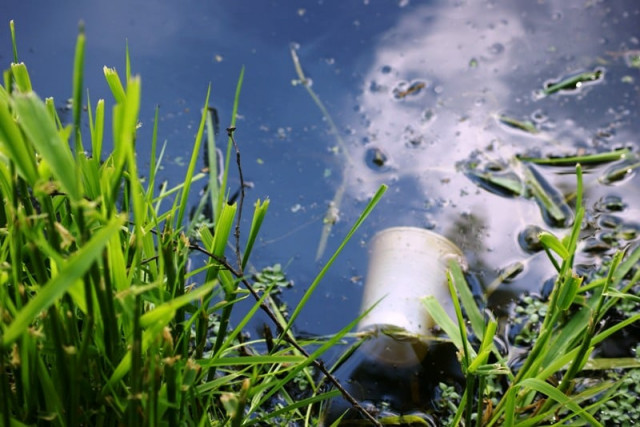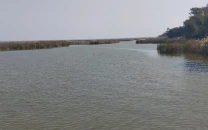SC lifts ban on transfers and postings of secretaries in Sindh
CJP berates govt for failing to provide clean drinking water to the public

STOCK IMAGE
However, the apex court’s five-judge larger bench, headed by Chief Justice of Pakistan Mian Saqib Nisar, continued the stay against transfer or posting of the provincial chief secretary till further orders.
These directives came during an unusual hearing on Saturday at the SC’s Karachi Registry as judicial work is ordinarily done in the courtrooms in the country’s superior courts on Saturday.
The bench also comprised justices Umar Ata Bandial, Faisal Arab, Ijazul Ahsan and Sajjad Ali.
At the outset, Justice Nisar told Chief Secretary Rizwan, Advocate-General Barrister Zamir Ghumro and other officers that the issue of non-supply supply of clean drinking water related to lives of the people, thus the judges could hear the matter till midnight.
“Provision of clean drinking water is the responsibility of the Sindh government,” remarked Justice Nisar. “We want to make it clear to the Sindh government that the Supreme Court also has the power of contempt of court order proceedings to use,” he cautioned.
He noted that the court-appointed judicial commission had highlighted problems relating to supply of contaminated drinking water and poor sanitation conditions and their causes, adding that the provincial government had not objected to the commission’s findings.
Safe water project: 116 filtration plants installed in different villages
The top judge remarked that Chief Minister Murad Ali Shah was summoned to give a timeframe to resolve these problems. He observed that the toxic industrial waste was being dumped into freshwater sources such as canals and rivers in the province, and the same was being supplied to the people for drinking.
He remarked that the tankers mafia was thriving because of scarcity of drinking water in the city.
Karachi Water and Sewerage Board (KWSB) Managing Director Syed Hashim Raza Zaidi informed the court that regular vigilance was being carried out to curb theft of the water in city.
“You will even find some philanthropists to help you if you are really willing to do work, but your will should be visible,” the CJP remarked.
Zaidi said water is supplied from the province’s largest freshwater reservoir, Keenjhar Lake, to the water board’s reservoirs where mud is separated and it becomes clean and fit for human consumption after proper chlorination. But, it gets contaminated because of leaks in the old underground water supply pipelines or their puncturing to steal water through illegal connections, he admitted.
He maintained that 30% of Karachi does not fall in the boards’ water distribution system.
The CJP asked in whose jurisdiction falls Bath Island. Zaidi said the area falls in the limits of the KWSB, where tankers run by the water utility or private ones supply water.
He said the private water tankers use ‘merely’ use 30% of Karachi’s water, which means 13 million gallons water per day.
Water, sanitation conditions: SC seeks Sindh government's reply to contempt of court plea
“People are compelled to buy water because of your failure,” the visibly irked CJP told the MD, asking who was backing the water tanker service that it was not coming to an end in Karachi.
The chief justice told the water utility’s chief that this will have to end now. He asked Zaidi for a timeframe, not of two or three years, to resolve the matter. “Otherwise, we will have to summon the chief minister once again,” he said.
Justice Bandial noted that 45,000 tankers could be run to supply 13MGD, which means the private tankers take water from KWSB and then sell it to residents.
Justice Arab asked Zaidi to explain the utilisation of the budget allocated every year to the water utility, as it had even failed to clean and maintain its installations. Zaidi said the pipelines were up to 80 years old, adding that planning was under way to replace them in phases, but it will take time.
The CJP asked him to submit a list detailing the water pipelines laid down across the city with their expiry dates.
“We are sitting here on our day off [and] I will keep sitting. Neither will I leave nor will I let the chief secretary go,” Justice Nisar told the officers. “We will show our powers and will pass orders if need be,” he cautioned.
SC takes Murad Ali Shah to task
He noted that 460MGD of domestic and sewerage waste was entering the sea without treatment. He told the officers that during a recent visit to Port Grand he had seen piles of garbage dumped in the sea.
The CJP warned that if the officers continue the practice of shifting responsibilities on each other, then the court will question the chief secretary and pass appropriate orders and action will also be taken against anyone found delinquent.
S-III
Justice Arab wondered that work had not even been started on the S-III project, which was conceived in 2007 at a cost of Rs7.98 billion, but its cost had increased to Rs36,000 billion over time. He further wondered that money was regularly allocated and released for the project, but not a single penny had been spent.
Angry at his own officers, Memon conceded: “Some people should be put before the firing squad.”
He blamed project director Imtiaz Magsi for the lack of progress in the project and fund utilisation.
Justice Nisar expressed his extreme displeasure over failure of the project director to complete work on S-III despite his undertaking given to the court in 2016 to complete it by June 2017.
“We have the power and authority to pass an order under Article 240 of the Constitution and will also take action for the contempt over breach of their own undertaking given in the court,” the CJP warned.
Commission seeks final report to curb water theft by industries
The chief secretary conceded that he had given an undertaking in court on behalf of his officers, but these officers were changing their course every day. “These people should be held responsible,” he candidly pleaded to the court.
The CJP recalled that the CM had complained in the court at a previous hearing that the SC had tied his hands by putting a ban on transfers and postings of secretaries of departments.
The bench vacated its stay placed on the transfers and postings of the concerned departments’ secretaries and directed the chief secretary to pick the team of his officers of his own choice. He was further directed to deliver the results. The hearing was adjourned till next Saturday.



















COMMENTS
Comments are moderated and generally will be posted if they are on-topic and not abusive.
For more information, please see our Comments FAQ